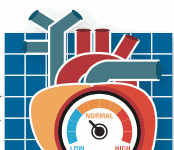Although its true that crustaceans such as shrimp have high levels of omega-3 unsaturated fatty acids (the consumption of which appears to reduce the likelihood of heart attack), they also contain a great deal of cholesterol. Unlike fats, which come in beneficial (polyunsaturated) and detrimental (saturated) varieties, cholesterol is cholesterol, and it is generally best to avoid frequent intake of foods containing large amounts of it. The American Heart Association recommends that we eat less than 300 milligrams (mg) of cholesterol per day. A single egg contains about 200 mg, while a half-cup of shellfish contains up to 100 mg. So consumption of eggs and shellfish should only be done in moderation. As for your question about serum cholesterol, roughly 70 percent of people are "hypo-responders"-in other words, their serum cholesterol levels show little or no change after a large increase in dietary cholesterol. The other 30 percent are termed "hyper-responders," whose serum cholesterol levels rise considerably after an increase in cholesterol consumption. Although hyper-responders would seem more likely to experience coronary artery disease from a diet high in cholesterol, this has not been demonstrated. Rather, hyper-responders react to egg-containing diets by growing larger, "fluffier" LDL ("bad" cholesterol) and HDL ("good" cholesterol) particles, which are associated with a decreased risk of atherosclerosis.
To continue reading this article or issue you must be a paid subscriber.
Sign in





